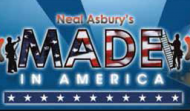
Recounting his appearance on Thom Hartmann’s progressive radio show on the RT Network, Neal Asbury began his nationally syndicated “Neal Asbury’s Made in America” show on Radio America (now on 46 stations), by reiterating his opinion that raising the minimum wage to $15 an hour will actually result in job losses, punishing the very people it is supposedly designed to help.
Made in America welcomed first-time guest Daniel M. Rothschild, the managing director of the State and Local Policy Project at the Mercatus Center at George Mason University. He coordinated the Mercatus Center’s research on state and local economic policy and directed the Gulf Coast Recovery Project.
Writing for the Weekly Standard, Rothschild detailed how a federal court in Louisiana will decide in the next few months how much oil company BP must pay in Clean Water Act penalties as a result of the 2010 Deepwater Horizon oil spill. The fine could total as much as $18 billion and, whatever the court determines, will rank among the largest in American history. How it gets spent will serve as a key test of the ability of conservative governors and legislatures to manage the money wisely and prevent it being usurped by cronyism, such as what occurred with the money spent on the economic stimulus program
“Under the terms of the RESTORE Act, which Congress passed in 2012 with strong bipartisan support, 80 percent of civil and administrative fines from the Deepwater Horizon spill go to a trust fund for environmental and economic restoration in the states of Louisiana, Mississippi, Alabama, Florida, and Texas. Of this, 65 percent goes directly to state and local governments for use in resource restoration, economic development, infrastructure building, and increasing resiliency against future disasters. All five states, of course, have GOP governors and Republican majorities in their legislatures,” noted Rothschild, who added that depending on how state officials spend this money, “the RESTORE Act could go down as a paradigm of effective oversight or as the conservative analog of the stimulus.”
Either way, Rothschild noted that conservatives will be in the driver’s seat. The only way to ensure that states allocate the funds properly is to make the spending process radically transparent and targeted towards genuine public goods. He pointed to the long-term plan being rolled out in Louisiana as an example of an initiative that is designed to ensure that the money is being spent between key constituents impacted by the BP spill, such as sportsmen, fisherman and conservation groups.
Neal Asbury and co-host Dr. Rich Roffman segued to a discussion about the worsening job situation in this country.
“The administration announced 203,000 new jobs, but if it’s like the other job reports released by this administration, it fails to mention how many of these jobs are low paying part-time jobs. As we know, families depending on part-time employment are five times more likely to live in poverty,” noted Neal.
Dr. Roffman added that 41 percent of these jobs are government jobs, which means that taxpayers are actually picking up the cost of these new jobs, much of which is money borrowed from China.
Neal also proposed that the employment figures don’t take into account the millions of Americans who have stopped looking for work, so their numbers aren’t included in the job projections. It also doesn’t look at the federal costs to support the 11 million Americans that are collecting social security disability– fifty percent of whom are collecting this money fraudulently. Or the fact that 47 million Americans are on food stamps.
“And let’s not forget 91 million people who have totally dropped out of the labor force—the U-6 statistic—that this administration refuses to talk about. Yet, the Obama administration keeps telling us that things are great. But we‘re not creating long-term jobs, and that’s a sad story for all Americans, concluded Dr. Roffman.
First-time guest Lowell Ponte Ph.D. joined the show. He is a former think tank futurist and one of the world’s most widely quoted experts on global climate change, and has been described as “the world’s most widely read investigative science reporter” when he worked at Reader’s Digest Magazine.
Ponte has been writing about the sad demise of Detroit, now going through bankruptcy, largely the result of a one-party political system and that fact that Detroit was essentially a one-industry town for so many years.
“A little known fact is that when Henry Ford opened his factory he couldn’t find enough qualified U.S. workers, so he was forced to import workers from the Middle East and elsewhere. This explains why Detroit has such a large Muslim population,” noted Ponte, who added that after the race riots of 1967, Detroit’s population dropped from 1.8 million to 700,000, taking with it the black middle class and the majority of whites. Today, 83 percent of Detroit is black.
Ponte catalogued the deterioration of a once great city, where today 41 percent of street lights don’t work, 1/3 of the buildings are abandoned, and the crime rate is 11 times higher than New York City causing downtown employers to hire their own police force. Ponte invited listeners to call 800-630-1494 to receive a free copy of his book “The Great Withdrawal.”
The final guest on Made in America was first-time guest James Sherk, the Heritage Foundation’s Senior Policy Analyst in Labor Economics, who agreed with Neal and Dr. Roffman that the minimum wage hike is a bad idea.
“The minimum wage may be well intentioned, but it winds up hurting the workers they are trying to help. When labor costs go up, fewer workers are hired, and the cost of the higher labor are passed onto the customers who are the least able to afford it,” said Sherk.
As a result, Sherk noted that fast food restaurants are looking at automated alternatives to higher labor costs by using touch screen ordering systems to reduce or eliminate waiters; and robotic burger makers that can make 360 burgers an hour, reducing or eliminating the need for fry cooks.
“These aren’t yet practical when hourly wages are at $7,00, but when they approach $15.00–it makes more economic sense, which could put 300,000 fast food jobs at risk,” concluded Sherk.es
Neal and Dr. Roffman concluded the show by returning to the exploration of cronyism and the government’s poor decision making.
“After spending $900 million on a website for Obamacare that doesn’t work, hiring a Canadian firm that couldn’t do the job, and not using American workers, Congressman Darrell Issa revealed that back in 2010 IBM approached the White House about creating the ACA website at no cost, using American workers. Their offer was turned down. How can anyone defend this?” asked Dr. Roffman.
Dr. Roffman discussed another misguided decision when a young girl in Portland was prevented by authorities from selling mistletoe in the town square from her father’s farm. She was encouraged instead to simply beg for the money. She turned the offer down, but was invited by Glenn Beck to appear on his show, where she wound up selling $30,000 worth of mistletoe bags—in one hour. A victory for the little guy and today’s entrepreneurs.
Each week Neal Asbury’s Made in America provides Neal’s insights into the week’s top news stories and their impact on the worlds of entrepreneurship, small business ownership and the overall economy. Neal’s analysis, together with co-host Dr. Richard Roffman, a veteran 30-year publisher with extensive domestic and international experience, takes a non-biased approach based on real life experience in business as an American manufacturer and exporter. Made in America airs nationally each Saturday from 7-8:00 PM on Radio America. Link to Made in America at http://www.nealasburysmadeinamerica.com.
DEC



